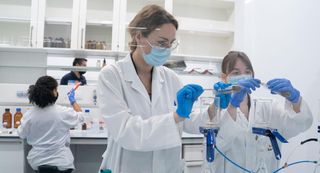- The Can Baumann building in Vic has been home to the new headquarters of the UVic-UCC research centre since the beginning of this year
- The institution’s technological and experimental capacity can be expanded as a result of the new laboratories, which include ecology, bioprocesses and instrumental analysis laboratories
The smell of tanned leather has not been noted for years at the Can Baumann building in Vic, former home of the old Colomer Munmany factory. After a long time in disuse during which it gathered dust, in 2017 activity returned to the building with the foundation of the Faculty of Medicine of the University of Vic - Central University of Catalonia (UVic-UCC), which occupies about 2,500 ². Since then, much of the property remained undisturbed until a new tenant moved into the building in 2021, who needed a change of clothes and has turned these old buildings into its home. At the start of 2021, the Biodiversity, Ecology, Technology and Environmental Management Center (BETA) of the UVic-UCC began to move in.
The move to Can Baumann is the first step in the consolidation of the FuturLab zone, which is the UVic-UCC Science and Technology Park. The move provides the centre with competitive, first-class facilities.
For a few months now, this research centre has been located in the Capuchin district of the capital of Osona, in new modern facilities adapted to the institution’s challenges in the medium and long term. The building works began last year with a total cost of approximately 1.5 million euros. The renovated buildings were opened this July by the Catalan Minister for Research and Universities, Gemma Geis. The renovations have made available to CT BETA two central buildings of the former factory, with a total built area of 1,260.80 m², right next to the Faculty of Medicine.
The new space will make it easier for CT BETA to develop knowledge in research, development and innovation projects and to transfer knowledge to the public and private sectors. The move to Can Baumann is the first step in the consolidation of the FuturLab zone, which is the UVic-UCC Science and Technology Park. The move provides the centre with competitive, first-class facilities. Inside the new premises are two large spaces: one for offices, work spaces for researchers, UCoworking rooms, spaces for technicians, meeting rooms, etc. and the other to house all the technology centre’s laboratories.

The new laboratories of the technology centre favour work at various scales of technological development, from small scales with very controlled conditions to reactors that operate in the real environment, a step prior to industrial application.
Laboratories for different lines of work
It is in the laboratory area that CT BETA has experienced the main qualitative leap, which is essential to be able to continue growing. It has specific laboratories for the centre’s various lines of work, such as the ecology laboratory for research in the field of aquatic and terrestrial ecosystems, the bioprocess laboratory and the spaces for pilot plants. The new laboratories of the technology centre favour work at various scales of technological development, from small scales with very controlled conditions to reactors that operate in the real environment, a step prior to industrial application. The new instrumental analysis laboratories are also notable. They offer BETA highly competitive analytical capabilities to characterize liquid, solid and gas samples.
Sergio Ponsá, director of CT BETA, considers that the new space “allows the promotion of current scientific and technological excellence and increases the impact and transfer of the centre’s results to society.” According to him, the new facilities expand the technological, experimental and analytical capacity to meet the needs of the entire value chain of the agri-food and environmental sector, from primary production to the production and recovery of value-added products. The centre’s current facilities will help to provide a better response to the needs of the territory. “We have always worked with the aim of being a useful tool for the industrial fabric to help companies to be more competitive by promoting the bioeconomy and sustainability,” explained Ponsá.
«We have always worked with the aim of being a useful tool for the industrial fabric to help companies to be more competitive by promoting the bioeconomy and sustainability»

At the forefront of research in five areas
Bioplastics, biofuels, bioenergy and bioeconomy We are heading to a “bio” world in the future. To respond to the many current environmental and social challenges, from fairer food distribution to climate change mitigation, we need to move towards a new production model based on renewable biological resources and their transformation into value-added products. This is one of the main strategic lines that CT BETA has been working on for some time. However, the centre’s research is divided into five main areas of expertise:

Environmental technologies and circular bioeconomy
Mabel Mora
“CT BETA has extensive experience and knowledge of processes for the recovery of solid, liquid and gas waste of industrial or urban origin. In this context, we work to develop and improve known, implemented processes such as anaerobic digestion, composting and membrane technologies, and on innovative processes such as cryoconcentration, bio-drying or solid state fermentation, among others.”

Applied ecology and global change
Lorenzo Proia
“This line of research at the technology centre promotes the study of aquatic and terrestrial ecosystems. In many cases, the research focuses on microbial communities that are relevant to the functioning of ecosystems. Based on knowledge about how ecosystems work, innovative, nature-based solutions are analysed to mitigate the impacts of global change.”

Soil and nutrient management
Evan Marks
“Improving the management of soils and fertilizers to promote the rural circular economy and achieve greater sustainability in agricultural practices is the main objective of this field of research. Our work is based on innovating in the efficient and responsible use of organic and inorganic fertilization practices.”

Accounting and optimization of sustainability
Joan Colón
“In this branch, CT BETA develops tools and methodologies to assess the sustainability of complex systems and thus assist in decision-making in industries, governments and public agencies, to move towards a more sustainable world. Our areas of work include agricultural and food systems, waste management systems and environmental technologies.”

Governance for sustainability
Mercè Boy
“The aim of our field of expertise is to promote initiatives and projects that seek to improve governance in the field of sustainability. With a view to building a more ecological and sustainable future, we are working to establish synergies with relevant stakeholders and institutions in the territory.”
In 2020, it took part in thirty transfer projects with companies. Currently, CT BETA is participating in many other projects, eighteen of which are European (six of them coordinated by this centre) and ongoing, in addition to others of national scope and for companies.
European projects with the participation of CT BETA in 2021
In its five areas of expertise, CT BETA is currently involved in numerous projects. In 2020, it took part in thirty transfer projects with companies. Currently, CT BETA is participating in many other projects, eighteen of which are European (six of them coordinated by this centre) and ongoing, in addition to others of national scope and for companies.
Among the most important European projects, there are several on the production of fertilizers or biofertilizers. This is the case of the Fertimanure (H2020) for the production of competitive, high value-added fertilizers from livestock manure; the Sea2Land (H2020), on the production of advanced biofertilizers from fishery waste; Fertilwastes (Interreg POCTEFA), in which co-products from waste treatment are valued and the Reflow (H2020) project, for the recovery of phosphorus to produce fertilizers from waste in the dairy sector.

In the field of waste management and recovery, this technology centre participates in European projects, including for example Circular Biocarbon (H2020-BBI), which aims to create a flagship biorefinery to enhance urban waste in high-value waste products. CT BETA is also taking part in the Rawmina (H2020), project for the recovery of high-value raw materials from mining waste; the Decost (ENI CBC MED), on decentralized composting in small and medium-sized populations), and the Demine (LIFE) project, to reduce the impact caused by residual effluents from abandoned mines.
CT BETA is working on other very varied projects in diverse fields, such as Vivaldi (H2020), on the recovery of high-value organic acids from CO2 emissions, Viobond (H2020-BBI), which is designed to construct the first large-scale industrial pilot plant to produce lignin resins; the AccelWater (H2020), project, to optimize water consumption in the food and beverage industry through monitoring and artificial intelligence tools; and Green Growth (Interreg MED), which works to promote the green and circular economy in the Mediterranean region, among many others.
All CT BETA projects can be consulted at this link.
A centre running for seven years
The Technological Center in Biodiversity, Ecology and Environmental and Food Technology (BETA) was founded in June 2014 to give impetus to research activity in the field of environmental technologies at the University of Vic - Central University of Catalonia (UVic-UCC). The first team of professionals had four people working on the ground floor of the Faculty of Science and Technology, a space they occupied until this year. Since then, CT BETA has grown and evolved significantly. It has expanded areas of work and knowledge, and become a research centre that is part of the TECNIO network. It is a benchmark in the entire country in technological development and knowledge transfer.
The CT BETA in figures (June 2021)
